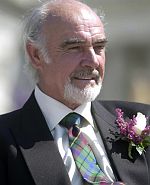This dashing, effortlessly masculine Scottish leading man successfully escaped the profitable straitjacket of James Bond to become one of the most beloved and respected stars of contemporary Hollywood. Sean Connery had been a bodybuilder, model and chorus boy before moving on to repertory, TV and film work in the 1950s. Having dropped out of school at age 13, he spent much of his free time in libraries as he traveled about performing in plays. Connery beat out many far bigger (and more expensive) names to play Ian Fleming's superspy James Bond in %22Dr. No%22 (1962), which made him a major 60s icon. He leavened the inherent violence of the character with his unflappably cool sophistication and humor. Connery periodically escaped Bondage to tackle a wider range of roles in other features (e.g., Alfred Hitchcock's %22Marnie%22 1964; %22A Fine Madness%22 1966; %22The Molly Maguires%22 1970) but most were box-office duds. He did some of his best work over the course of his significant collaboration with director Sidney Lumet: %22The Hill%22 (1965), as a convict in a military prison; %22The Anderson Tapes%22 (1971), as an ex-con masterminding a large-scale heist; %22The Offense%22 (1973), as a London detective who beats a suspect to death; %22Murder on the Orient Express%22 (1974), as part of the all-star ensemble; and %22Family Business%22 (1989), a critical and commercial misfire in which he portrayed the proud patriarch of a criminal clan with Dustin Hoffman and Matthew Broderick as his son (!) and grandson respectively.
Connery attempted to abandon 007 time-and-again but audiences did not at first support his efforts. %22Diamonds Are Forever%22 (1971) marked the beginning of his 12-year absence from Bond pictures. Connery utilized this period to star in a wide range of interesting adventure films including John Boorman's %22Zardoz%22 (1974), John Huston's %22The Man Who Would Be King%22 (1975), John Milius' %22The Wind and the Lion%22 (1975), Richard Lester's %22Robin and Marian%22 (1976), and, in a crucial supporting role, Terry Gilliam's %22Time Bandits%22 (1981). A little paunchy, but still handsome and charismatic, Connery donned his toupee and returned to his most celebrated role for the aptly titled %22Never Say Never Again%22 (1983), which proved to be a box-office hit.
Connery followed up with the popular fantasy film, %22Highlander%22 and the successful international co-production %22The Name of the Rose%22 (both 1986) before hitting a home run with an Oscar-winning supporting role in Brian De Palma's adaptation of %22The Untouchables%22 (1987). Playing Malone, a sly and crafty old Irish cop, he easily eclipsed Kevin Costner, the film's ostensible leading man. The success of this film placed Connery firmly back on the A-list of modern Hollywood leading men--albeit often in fatherly roles and usually playing older than his actual age. His renewed star shone particularly brightly in Steven Spielberg's third installment in the Indiana Jones series, %22Indiana Jones and the Last Crusade%22 (1989), as the alternately aloof and irascible father of Harrison Ford.
Though he has been an enduring presence harking back to the stars of the Hollywood studio system, Connery has also been a serious actor who meticulously prepares for his roles. He has trained extensively in movement and has claimed that he never accepts a role until he has worked out how the character should move. Connery has achieved impressive subtleties of characterization within a surprisingly wide range of parts.
One of the most sought-after actors in the industry, Connery has kept busy regardless of whether his films hit or miss. He has been a proponent of the always-keep-working school in part because of his financial support of the Scottish National Theater. That Connery is an audience favorite was confirmed in 1991 with his cameo as King Richard the Lionhearted in %22Robin Hood, Prince of Thieves%22. His appearance in the denouement, as Kevin Costner and Mary Elizabeth Mastrantonio marry, caused audiences worldwide to cheer enthusiastically, even though Connery was doing nothing particularly heroic. Subsequent credits have included portraying the Russian captain in %22The Hunt for Red October%22 and a London publisher in %22The Russia House%22 (both 1990), and the titular %22Medicine Man%22 (1992), which dealt with the destruction of the Amazon basin and the suggestion that the cure for cancer was chopped away in the madness of development. The last marked his debut as an executive producer, a chore he also performed on %22Rising Sun%22 (1993), in which Connery teamed with Wesley Snipes in a police drama with international ramifications.
In 1995 and 1996, Connery alternated between medieval epics (as King Arthur in %22First Knight%22 and the voice of Draco the dragon in %22Dragonheart%22) and gritty contemporary action dramas (as a famous lawyer attempting to prove a man innocent of murder in %22Just Cause%22 and a government agent with particular knowledge of Alcatraz in the box-office bonanza %22The Rock%22). He turned villainous as a man bent on controlling the world's weather in the big screen version of %22The Avengers%22 (1998) and lent his pantherish charms to the role of an aging cat burglar in %22Entrapment%22 (1999). In 2000, Connery earned critical kudos for his turn as a reclusive author who mentors a promising young writer in %22Finding Forrester%22. The actor would not appear on screen again until 2003, when he appeared in the Victorian era action adventure %22The League of Extraordinary Gentlemen,%22 based on the popular comic book series. Connery played the fictional hero Allan Quatermain--sort of a Victorian precurser to Indiana Jones--who leads of team of characters culled from popular novels of the late 19th Century. The actor reportedly clashed with director Steve Norrington, and their off-screen friction didn't help the on-screen quality of the finished film. Rumors swirled that the actor was on the brink of a formal retirement from the big screen when he abruptly dropped out of 20th Century Fox's %22Josiah's Canon%22 and walked away from a $17.5 million paycheck, but in 2005 he announced plans to reprise his role as James Bond one last time for Electronic Arts' videogame based on the 007 adventure From %22Russia with Love.%22



